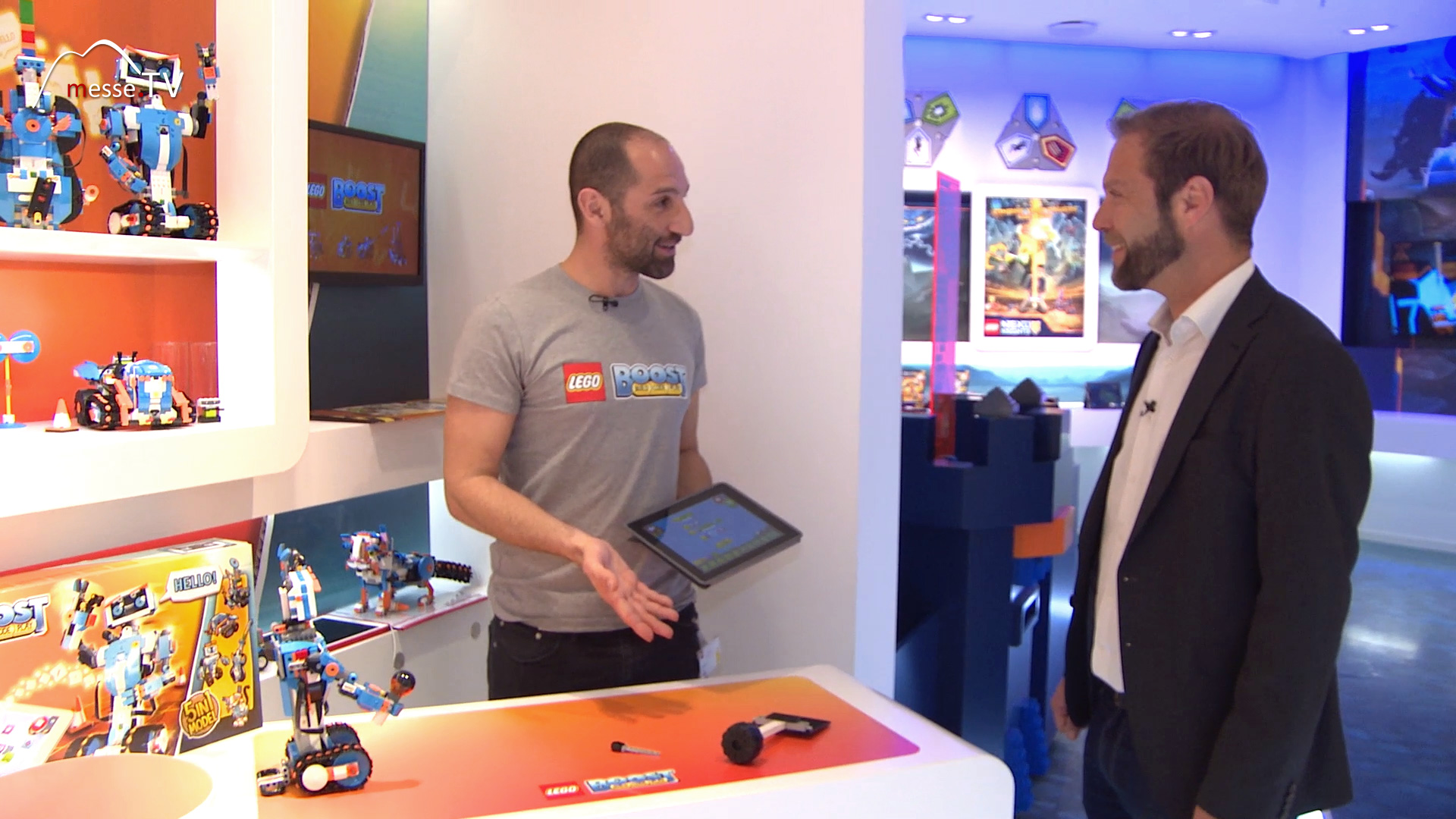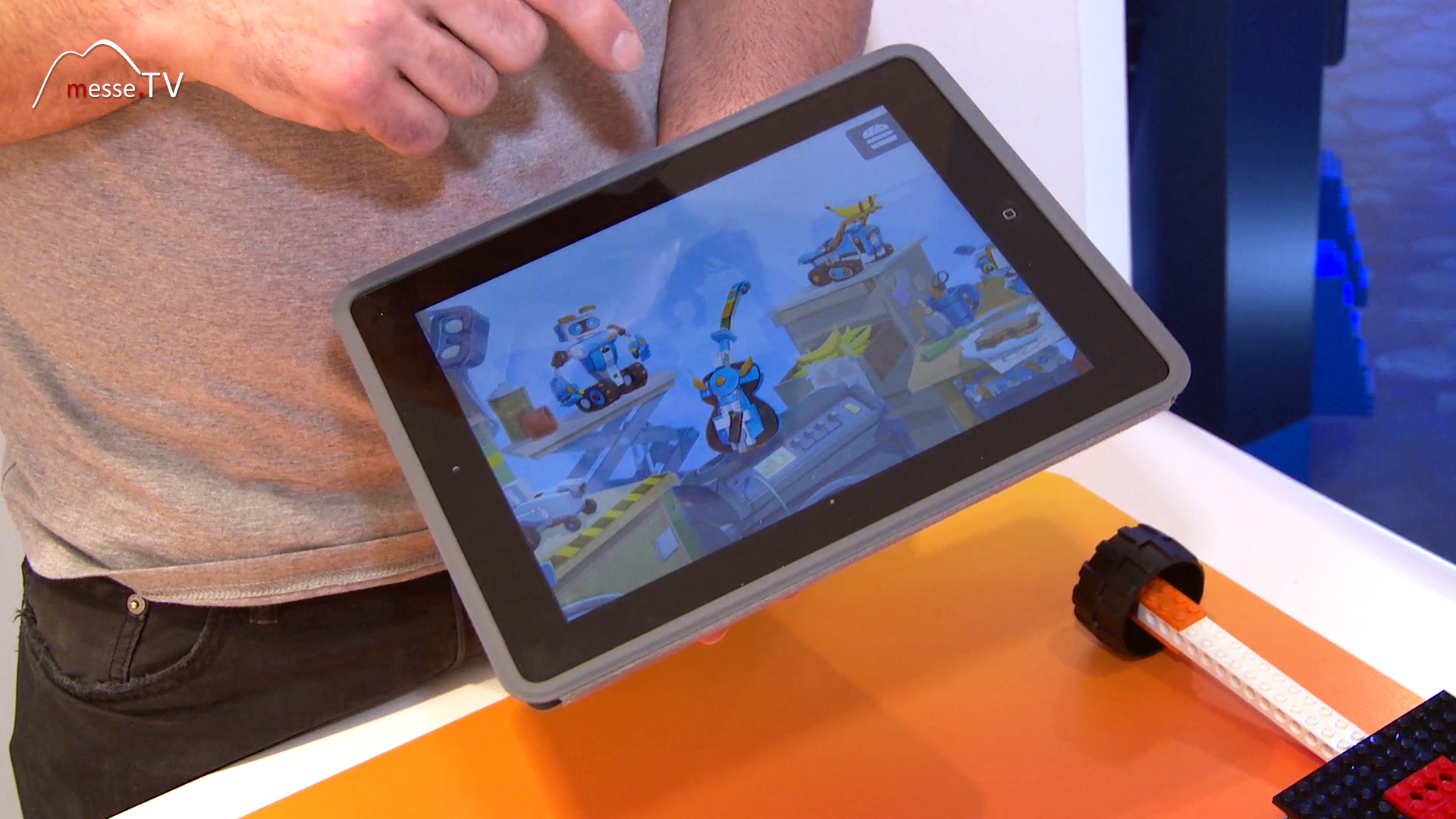Programmable toys are a clear trend this year. This is also a theme at LEGO and LEGO BOOST is a real hit. The set can be used to build figures such as Vernie the robot, a cat or a guitar. Once the building blocks have been assembled, they can be programmed and controlled using an app. Without a doubt, Play 4.0 combined with the classic LEGO master builder tradition.
Even Lego - probably the most famous building blocks in the world are now programmable and I'm going to take a look at what that looks like! Jürgen Groh: Mr. Horak, hello to you! LEGO Boost is one of the main themes at LEGO this year, what's behind it? Mr. Horak: The idea behind it is that we have entered the world of smart toys, which quite simply means that we are combining physical and digital play. As we can already see quite clearly: Build. Code. Play. So you build, the classic build. Code, the simple programming for children because it's for ages 7-12. Play is also included. Here it is important that we have a package where you can build 5 models. Jürgen Groh: Are these the 5 models that I can see here? Mr. Horak: Here I have Vernie the robot, then the guitar 4000, the production site, Frankie the cat and the rover. I can build these 5 models from them. I can operate one at a time and if I don't feel like it anymore, I can go over to the next one and reassemble it. Jürgen Groh: You can build all 5 models with this one set? Mr. Horak: Exactly! You can assemble all 5 with this set.


Jürgen Groh: Programming - code is a theme at the Spielwarenmesse this year, I've seen it a few times now. Why is that? Mr. Horak: Yes, definitely! Smart toys are becoming more and more popular. More and more children have access to the iPad or Android, to the tablet, and they can now combine playing with LEGO toys, i.e. classic play, via the tablet. Jürgen Groh: Can we see how it works with the tablet? Mr. Horak: With pleasure. LEGO has produced an app for it, which is free and really easy to explain. I have the 5 figures here on the screen. Now we have Vernie the robot on the front, for example, which means I would go to Vernie on the tablet. Tap on the construction set. I've already prepared something a bit, if I tap on the project, you can see that I've already pre-programmed something here. Let me briefly show you how programming works in general. So if I drag and drop (i.e. I take it from the lower image bar and insert it on the main screen) the properties into the main screen, I have the option of entering a command here. In other words, I move straight ahead twice by dragging these arrows into the main screen twice and finally I want Vernie to rotate once more, then I drag the rotating arrow into the main screen. If I were to press play now, Vernie would move exactly according to my commands. Jürgen Groh: Okay. Mr. Horak: I did that within seconds, that's why it's called simple programming and is intended for children. I'll also show you something else that I've already pre-programmed, as I said. This is the moment when he moves. But he can also talk to me, I can also interact with him. "Hello, my name is Vernie, what is your name?" "My name is Jürgen!" "That's a nice name." He is of course very happy to meet you. Here I also have the option that he first waits to hear what you say so that he can then continue. Jürgen Groh: Did he really respond to me or could I have said something else? Mr. Horak: You could have said something else. Jürgen Groh: He simply answers the question again then. Mr. Horak: He's waiting for a voice command, so to speak, whether it's a different name or something else, it doesn't matter at the moment, but he's waiting for a voice command. Jürgen Groh: Vernie can also shoot? Mr. Horak: Exactly, it also has a shooting function, it's up here. Of course, I give it a command again and when I press play, it shoots. Jürgen Groh: Bull's eye.
Mr. Horak: Has landed a direct hit and of course says thank you. He's a friendly robot. We have the option of executing various commands here. If I want to make him dance endlessly - spinning in circles, I just press play. Then it won't stop doing it. I can really let it drive in a straight line for a very, very long time. And only when I press stop again would it stop. Jürgen Groh: The fascination for children is to bring a toy to life? Mr. Horak: That's right. It's important that Vernie is brought to life and we've ensured that with a Move up. In other words, there is a motor that controls everything. The robot is connected to the tablet via Bluetooth, I can give the commands and then bring the toy to life. The great thing is that I can use the Move up that I have here not only for the models, but also to bring every single classic LEGO model to life. Jürgen Groh: I see a cat in the back, what's its name? Mr. Horak: Frankie the cat.
Jürgen Groh: And what can it do? Mr. Horak: As we know, cats have different moods and we have already pre-programmed them. With Frankie, it's important to know that she reacts to functions, for example when I put her on her side or back or hold her in my arms, she reacts differently. When I look at the tablet, I notice that there is a function where she purrs, where she is doing well with a little heart at the top, here she is angry or here she wants to sleep, for example, and I can activate these in various ways: To do this, I go to Play. For example, if I give her the milk bottle from the front, she is naturally happy and moves her tail, her eyes and you can hear her drinking. Jürgen Groh: Very active! Mr. Horak: But if I give her the milk bottle the wrong way round and she can't drink from it, she gets particularly annoyed and hisses. So you can't do that under any circumstances. Jürgen Groh: Does it have cameras or sensors in it or how can we understand it? Mr. Horak: Yes, exactly, you can see a sensor here in the front of her face and it recognizes that, I point to it. Jürgen Groh: What did she react to now? Mr. Horak: Directly to my orange skin. Jürgen Groh: With what feeling? Mr. Horak: With a pleasant feeling because she gets something to drink, because the milk bottle is also orange. She can really distinguish the colors. What she also recognizes and I can still do is lay her on her back. Now she sleeps, for example, and when she has had enough of sleeping I can take her in my arms and she purrs. Of course she likes that. Jürgen Groh: It was a wonderful insight into the world of LEGO. I was very pleased. Thank you very much, see you again.